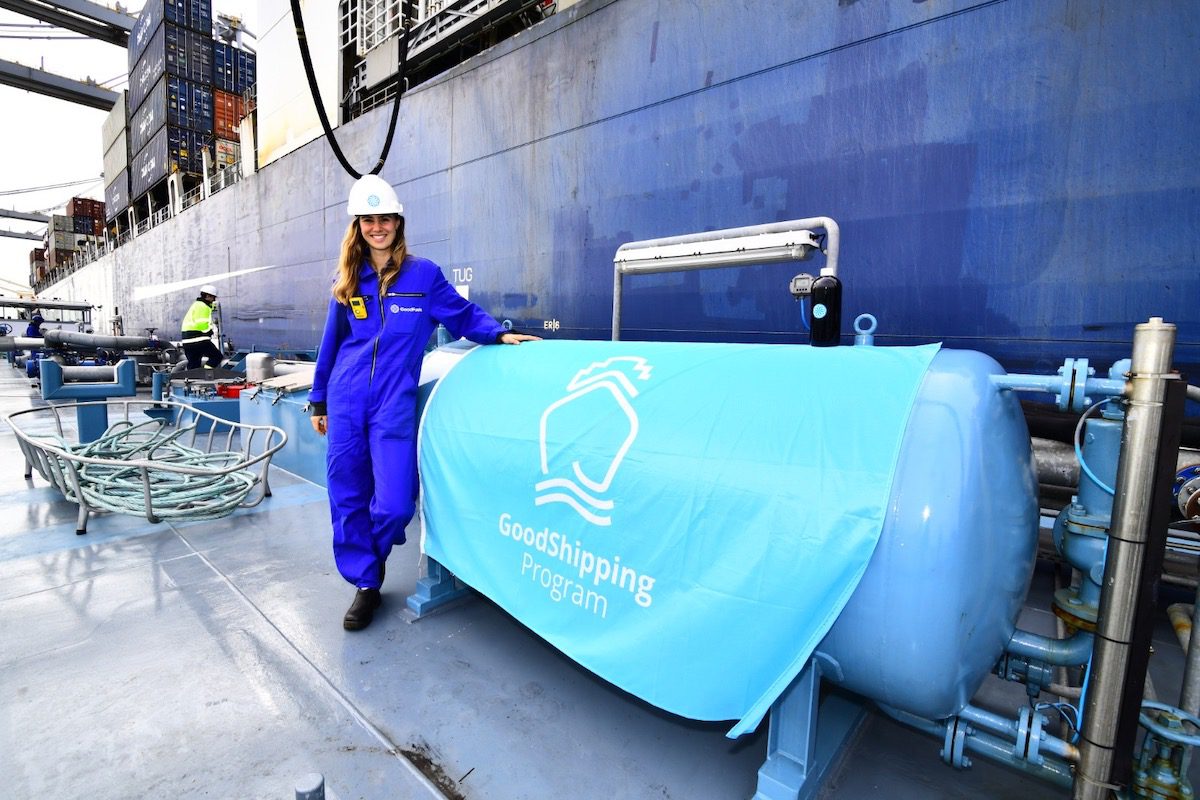
The Importance of Biofuels in Marine Transportation
Introduction
Biofuels play a crucial role in the pursuit of sustainable marine transportation. These fuels, derived from renewable sources such as plant oils and animal fats, offer numerous environmental benefits and can help reduce greenhouse gas emissions. This article explores the significance of biofuels in marine transportation, highlighting their relevance in the context of promoting sustainability and mitigating climate change.
Historical Background
The development and use of biofuels in marine transportation can be traced back to the early days of engine-powered ships. In the late 19th century, Rudolf Diesel designed the first compression ignition engine to run on vegetable oil, demonstrating the potential of biofuels in transportation. Over time, advancements in technology and the need for cleaner fuels led to the evolution of biofuel production methods.

Key Concepts and Definitions
Biofuels encompass various types used in marine transportation, including biodiesel, bioethanol, and biogas. Biodiesel, derived from vegetable oils or animal fats, is commonly blended with petroleum diesel to reduce emissions. Bioethanol, produced from crops such as sugarcane or corn, is used as a gasoline additive. Biogas, generated through the anaerobic digestion of organic waste, can be utilized as a fuel in engines or converted into liquefied natural gas.
Sustainability is a key aspect of biofuel production, encompassing environmental, social, and economic considerations. Sustainable biofuel production focuses on minimizing environmental impacts, protecting biodiversity, and ensuring the availability of resources for future generations.
Main Discussion Points
Benefits of Biofuels in Marine Transportation
Biofuels offer a range of benefits in marine transportation. Firstly, they contribute to the reduction of greenhouse gas emissions and air pollutants. Compared to conventional fossil fuels, biofuels have lower carbon content and emit fewer harmful substances, thereby improving air quality and mitigating climate change.
Secondly, biofuels enhance energy efficiency and reduce the carbon footprint of marine vessels. The utilization of biofuels can lead to more efficient combustion processes, resulting in increased mileage and reduced fuel consumption. This not only reduces operating costs for marine transportation companies but also decreases the industry’s overall carbon emissions.
Lastly, biofuels provide an opportunity for renewable energy sources and reduced dependence on fossil fuels. As finite resources, fossil fuels are subject to price volatility and geopolitical risks. Biofuels, on the other hand, can be produced from sustainable feedstocks, offering a more reliable and environmentally friendly alternative.
Challenges and Limitations of Biofuels in Marine Transportation
While biofuels present numerous advantages, they also face challenges and limitations in marine transportation. One challenge is the availability and sustainability of feedstocks. The production of biofuels requires significant quantities of feedstock crops or organic waste, which can compete with food production or lead to deforestation. Ensuring a sustainable and diverse feedstock supply is crucial to avoid negative environmental and social impacts.
Technological limitations and infrastructure requirements pose additional challenges. Marine vessels may require engine modifications or fuel storage systems to accommodate biofuels. Moreover, the availability of biofuel refueling infrastructure is limited in many regions, hindering widespread adoption.
Cost competitiveness and market viability are also important considerations. The production costs of biofuels can be higher than those of conventional fuels, making them less economically attractive for some operators. However, with advancements in technology and economies of scale, the cost gap is gradually narrowing, making biofuels more competitive in the market.
Policy and Regulatory Frameworks for Biofuels in Marine Transportation
To promote biofuel adoption, various international and regional regulations have been implemented. These regulations aim to incentivize the use of biofuels, set sustainability criteria, and establish certification schemes. For example, the International Maritime Organization (IMO) has set targets to reduce greenhouse gas emissions from the shipping industry, encouraging the use of biofuels and other alternative fuels.
Incentives and subsidies further support biofuel production and use. Governments and industry stakeholders provide financial incentives to encourage investments in biofuel technologies and infrastructure. These incentives can help offset the higher production costs, making biofuels more financially viable.
Case Studies or Examples
Case study : Implementation of biofuels in a specific marine transportation sector
In the shipping industry, companies such as Maersk have successfully incorporated biofuels into their operations. Maersk’s Triple-E class container vessels have achieved significant emissions reductions by utilizing biofuels as part of their fuel mix. This case study demonstrates the feasibility and benefits of biofuel adoption in large-scale shipping operations.
Case study : Successful biofuel projects in different regions around the world
The Nordic countries, particularly Sweden and Finland, have made significant progress in adopting biofuels in marine transportation. They have developed sustainable biofuel production facilities and established supply chains to support the use of biofuels in ships and ferries. These projects serve as examples of successful biofuel integration and highlight the potential for global replication.
Case study : Challenges faced and lessons learned from biofuel adoption in marine transportation
The biofuel industry has faced challenges in terms of feedstock availability and sustainability. One example is the controversy surrounding the use of palm oil as a feedstock for biodiesel production. Palm oil cultivation has led to deforestation and environmental degradation in some regions. Lessons learned from such challenges include the importance of implementing robust sustainability criteria and diversifying feedstock sources.
Current Trends or Developments
Research and development efforts are ongoing to improve biofuel production efficiency and sustainability. Scientists and engineers are exploring advanced techniques such as algae-based biofuels and waste-to-energy conversion to enhance the viability of biofuels as a renewable energy source for marine transportation.
Collaboration between industry stakeholders and government agencies is crucial to promote biofuel adoption. Partnerships and initiatives are being formed to support research, development, and commercialization of biofuels. These collaborations aim to accelerate the transition to sustainable marine transportation.
Adoption of biofuels in specific marine transportation sectors and regions is gaining momentum. Countries like Norway and the Netherlands have set ambitious targets to increase the use of biofuels in their maritime industries. Additionally, some fishing communities are adopting biofuels to reduce their environmental impact and comply with sustainability regulations.
Challenges or Controversies
The use of food crops for biofuel production has sparked debates in recent years. Critics argue that diverting food crops for fuel production can contribute to food scarcity and price volatility. Balancing the demand for biofuels with the need for food security remains a challenge, highlighting the importance of sustainable feedstock choices and land-use planning.
Biofuel production can also have environmental and social impacts. For instance, the cultivation of certain feedstock crops may require large amounts of water, fertilizers, and pesticides, leading to water pollution and biodiversity loss. Ensuring sustainable practices and minimizing negative impacts are essential for the long-term viability of biofuels.
Potential conflicts with land use and food security must also be considered. The large-scale cultivation of feedstock crops may compete with other land uses, such as agriculture or conservation. Striking a balance between biofuel production and land availability is crucial to avoid negative consequences for food supply and ecosystems.
Future Outlook
The future of biofuels in marine transportation looks promising. With increasing environmental awareness and the need to address climate change, biofuels are expected to play a larger role in reducing greenhouse gas emissions and achieving sustainability goals.
Emerging biofuel technologies, such as algae-based biofuels and advanced waste-to-energy conversion, hold great potential for the industry. These innovative approaches offer higher efficiency, reduced environmental impacts, and increased feedstock availability.
Integration of biofuels with other sustainable marine transportation solutions, such as electric propulsion and renewable energy systems, presents an opportunity for synergistic benefits. Combining different technologies can further reduce emissions and dependence on fossil fuels, leading to a more sustainable and resilient marine transportation sector.
Conclusion
Biofuels have emerged as a key solution for achieving sustainable marine transportation. Their ability to reduce greenhouse gas emissions, improve energy efficiency, and offer renewable alternatives to fossil fuels make them crucial in the fight against climate change. However, challenges such as feedstock availability, technological limitations, and market competitiveness must be addressed to ensure their widespread adoption. By implementing supportive policies, investing in research and development, and fostering collaborations, the industry can unlock the full potential of biofuels in achieving a more sustainable future.